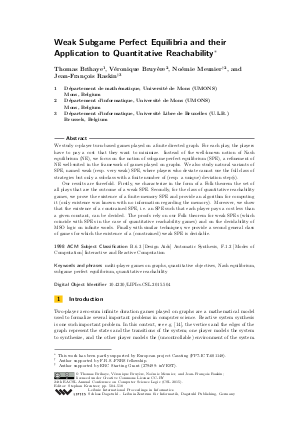Weak Subgame Perfect Equilibria and their Application to Quantitative Reachability
Authors Thomas Brihaye, Véronique Bruyère, Noémie Meunier, Jean-Francois Raskin
-
Part of:
Volume:
24th EACSL Annual Conference on Computer Science Logic (CSL 2015)
Part of: Series: Leibniz International Proceedings in Informatics (LIPIcs)
Part of: Conference: Computer Science Logic (CSL) - License:
 Creative Commons Attribution 3.0 Unported license
Creative Commons Attribution 3.0 Unported license
- Publication Date: 2015-09-07
File

PDF
LIPIcs.CSL.2015.504.pdf
- Filesize: 0.52 MB
- 15 pages
Document Identifiers
Subject Classification
Keywords
- multi-player games on graphs
- quantitative objectives
- Nash equilibrium
- subgame perfect equilibrium
- quantitative reachability
Metrics
- Access Statistics
-
Total Accesses (updated on a weekly basis)
0PDF Downloads0Metadata Views
Abstract
We study n-player turn-based games played on a finite directed graph. For each play, the players have to pay a cost that they want to minimize. Instead of the well-known notion of Nash equilibrium (NE), we focus on the notion of subgame perfect equilibrium (SPE), a refinement of NE well-suited in the framework of games played on graphs. We also study natural variants of SPE, named weak (resp. very weak) SPE, where players who deviate cannot use the full class of strategies but only a subclass with a finite number of (resp. a unique) deviation step(s). Our results are threefold. Firstly, we characterize in the form of a Folk theorem the set of all plays that are the outcome of a weak SPE. Secondly, for the class of quantitative reachability games, we prove the existence of a finite-memory SPE and provide an algorithm for computing it (only existence was known with no information regarding the memory). Moreover, we show that the existence of a constrained SPE, i.e. an SPE such that each player pays a cost less than a given constant, can be decided. The proofs rely on our Folk theorem for weak SPEs (which coincide with SPEs in the case of quantitative reachability games) and on the decidability of MSO logic on infinite words. Finally with similar techniques, we provide a second general class of games for which the existence of a (constrained) weak SPE is decidable.
Cite As Get BibTex
Thomas Brihaye, Véronique Bruyère, Noémie Meunier, and Jean-Francois Raskin. Weak Subgame Perfect Equilibria and their Application to Quantitative Reachability. In 24th EACSL Annual Conference on Computer Science Logic (CSL 2015). Leibniz International Proceedings in Informatics (LIPIcs), Volume 41, pp. 504-518, Schloss Dagstuhl – Leibniz-Zentrum für Informatik (2015)
https://doi.org/10.4230/LIPIcs.CSL.2015.504
BibTex
@InProceedings{brihaye_et_al:LIPIcs.CSL.2015.504,
author = {Brihaye, Thomas and Bruy\`{e}re, V\'{e}ronique and Meunier, No\'{e}mie and Raskin, Jean-Francois},
title = {{Weak Subgame Perfect Equilibria and their Application to Quantitative Reachability}},
booktitle = {24th EACSL Annual Conference on Computer Science Logic (CSL 2015)},
pages = {504--518},
series = {Leibniz International Proceedings in Informatics (LIPIcs)},
ISBN = {978-3-939897-90-3},
ISSN = {1868-8969},
year = {2015},
volume = {41},
editor = {Kreutzer, Stephan},
publisher = {Schloss Dagstuhl -- Leibniz-Zentrum f{\"u}r Informatik},
address = {Dagstuhl, Germany},
URL = {https://drops.dagstuhl.de/entities/document/10.4230/LIPIcs.CSL.2015.504},
URN = {urn:nbn:de:0030-drops-54345},
doi = {10.4230/LIPIcs.CSL.2015.504},
annote = {Keywords: multi-player games on graphs, quantitative objectives, Nash equilibrium, subgame perfect equilibrium, quantitative reachability}
}
Author Details
References
-
Thomas Brihaye, Véronique Bruyère, Julie De Pril, and Hugo Gimbert. On subgame perfection in quantitative reachability games. Logical Methods in Computer Science, 9, 2012.

-
Thomas Brihaye, Véronique Bruyère, Noémie Meunier, and Jean-François Raskin. Weak subgame perfect equilibria and their application to quantitative reachability. CoRR, abs/1504.01557, 2015.

-
Thomas Brihaye, Julie De Pril, and Sven Schewe. Multiplayer cost games with simple Nash equilibria. In LFCS, volume 7734 of Lecture Notes in Comput. Sci., pages 59-73. Springer, 2013.

-
Véronique Bruyère, Noémie Meunier, and Jean-François Raskin. Secure equilibria in weighted games. In CSL-LICS, pages 26:1-26:26. ACM, 2014.

-
Krishnendu Chatterjee, Laurent Doyen, and Thomas A. Henzinger. Quantitative languages. ACM Trans. Comput. Log., 11, 2010.

-
János Flesch, Jeroen Kuipers, Ayala Mashiah-Yaakovi, Gijs Schoenmakers, Eilon Solan, and Koos Vrieze. Perfect-information games with lower-semicontinuous payoffs. Math. Oper. Res., 35:742-755, 2010.

-
Drew Fudenberg and David Levine. Subgame-perfect equilibria of finite- and infinite-horizon games. Journal of Economic Theory, 31:251-268, 1983.

-
Drew Fudenberg and Jean Tirole. Game Theory. MIT Press, 1991.

-
Miroslav Klimos, Kim G. Larsen, Filip Stefanak, and Jeppe Thaarup. Nash equilibria in concurrent priced games. In LATA, volume 7183 of Lecture Notes in Comput. Sci., pages 363-376. Springer, 2012.

-
H.W. Kuhn. Extensive games and the problem of information. Classics in Game Theory, pages 46-68, 1953.

-
Jean-François Mertens. Repeated games. In Internat. Congress Mathematicians, American Mathematical Society, pages 1528-1577. Providence, RI, 1987.

-
J. F. Nash. Equilibrium points in n-person games. In PNAS, volume 36, pages 48-49. National Academy of Sciences, 1950.

-
Martin J. Osborne and Ariel Rubinstein. A course in Game Theory. MIT Press, Cambridge, MA, 1994.

-
Amir Pnueli and Roni Rosner. On the synthesis of a reactive module. In POPL, pages 179-190. ACM Press, 1989.

-
Stéphane Le Roux and Arno Pauly. Infinite sequential games with real-valued payoffs. In CSL-LICS, pages 62:1-62:10. ACM, 2014.

-
Ariel Rubinstein. Comments on the interpretation of game theory. Econometrica, 59:909-924, 1991.

-
Eilon Solan and Nicolas Vieille. Deterministic multi-player dynkin games. Journal of Mathematical Economics, 39:911-929, 2003.

-
Wolfgang Thomas. Automata on infinite objects. In Handbook of Theoretical Computer Science, Volume B: Formal Models and Sematics (B), pages 133-192. Elsevier Science Publishers, Amsterdam, 1990.

-
Michael Ummels. Rational behaviour and strategy construction in infinite multiplayer games. In FSTTCS, volume 4337 of Lecture Notes in Comput. Sci., pages 212-223. Springer, 2006.

